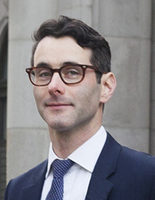Beyond cups of coffee, what does an office intern really offer? In youth-centered industries, older generations rely on the trend-savvy interns more than they realize or choose to admit.
Assistant Professor of Sociology Alexandre Frenette’s new research suggests that, at least in artistic fields, the intern’s novel understanding of cultural trends provides a key ingredient to the creativity of a company.
Frenette, who is also associate director of the Curb Center for Art, Enterprise and Public Policy, investigated the recording industry to better understand how older and younger employees interact. Through observation and interviews, Frenette found that the high turnover rates of interns provided a constant source of touchpoints with the industry’s target audience. Companies subtly extract and utilize this market knowledge, a bureaucratic tendency which Frenette labels: leveraging youth.

Such knowledge extraction occurs through both formal and informal means. Interns provide an informal window into market trends through their daily actions around the office: what they wear, how they speak, tools they use, etc. Experienced employees can capitalize on this through careful observation as well as by “soliciting insights, often through seemingly casual conversation,” said Frenette.
Companies also leverage youth using formalized methods such as intern-based focus groups and low stakes assignments. Interns might be tasked with “devising a test marketing plan for an upcoming release, suggesting lesser-known venues to promote an artist or…propose new, unsigned artists.”
Frenette found that despite the intern’s advantageous understanding of the industry’s target audience, “collaboration between members of these two groups is not a forgone conclusion.”
Differences in age and experience, Frenette observed, led to office tensions. Older generations looked down on the newcomers for their lack of professionalism. Meanwhile the newcomers criticized their superiors for lacking artistic and technological savvy. Frenette divided these tensions into three categories of conflict: aesthetic, technological and career.
“Tensions emerge as newcomers attempt to define older artistic generations as out of touch,” said Frenette. Similarly, interns and some younger employees often question the technological abilities of the older population. This puts experienced employees on edge as they are constantly forced to reaffirm their relevance in fickle trend-setting fields. But according to Frenette, “being a hip, young go-getter is not enough to be a good record industry worker.” The newcomer’s desperation to climb the career ladder often puts them on a collision course with the guardians of the industry’s institutional knowledge.
The ways in which the younger generations threaten the old and vice versa deters collaboration and decreases mentorship. It is up to businesses to figure out how to overcome these tendencies and maximize creativity through intergenerational teamwork.
“To optimize collaboration, the acknowledgement of what each party brings to the table is critical. We need to make sure internships offer high quality educational experiences while also rewarding interns for their understanding of cutting edge trends. We should also address the often unspoken stigma of being “old” in youth centered field,” said Frenette.
According to Frenette, these findings can be applied well beyond the recording industry. “As the proportion of people who earn bachelor’s degrees continues to rise, and pushes more and more individuals to rely on internships as a way to stand out, most industries will face intergenerational tensions and have to figure out how to leverage youth.”